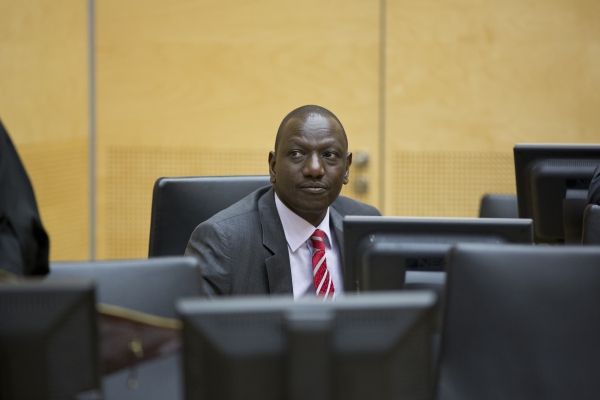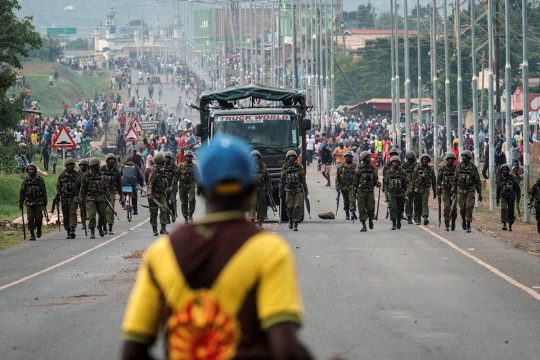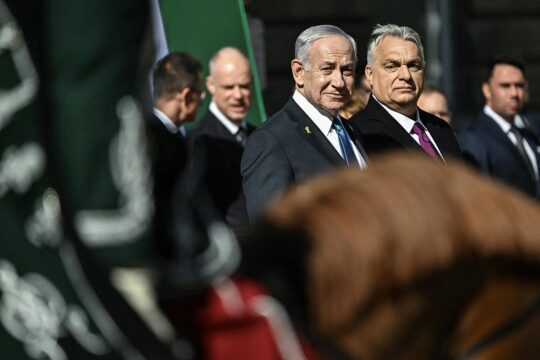Kenya has won its long battle against the International Criminal Court. ICC judges on Tuesday decided to drop the charges against Kenyan Deputy President William Ruto and radio presenter Joshua Sang. The two men had been accused of crimes against humanity committed in violence that swept Kenya after presidential elections in December 2007. Out of the six Kenyan suspects originally targeted by the ICC in March 2011, not a single one will have been convicted.
Although now free of all the charges, Ruto and Sang have not been acquitted. The judges decided to drop the charges because the prosecution had not brought enough evidence showing their responsibility in the 2007-2008 post-election violence. According to the Prosecutor, William Ruto had built a “network” of businessmen, tribal leaders, youth militia and journalists to plan and organize the violence. The Prosecutor did not convince the judges, but Ruto and Sang are not cleared. Their joint trial opened in September 2013 has been marred by interference. Prosecutor Fatou Bensouda had already denounced what she called a vast network of corruption, saying her investigations had been “systematically sabotaged” by the use of threats and bribes to dissuade witnesses from testifying or incite them to retract their statements. Three Kenyans have been charged by the ICC for “offences against the administration of justice”. Two have been arrested in Nairobi, but they have not been transferred to the ICC in The Hague. When the ICC opened its investigation in 2010, this raised the hopes of many in Kenya who thought international justice would be free of interference. But the Court has not managed to be free of it, despite costly protection measures which have proven ineffective in this case. In their decision, the judges left open the possibility that a new case could be opened against Ruto and Sang, either before the ICC if the Prosecutor brings a new case, or before the Kenyan judicial system. The latter seems very unlikely at the present time.
“A nightmare”
Reacting on his Facebook page, Kenyan President Uhuru Kenyatta said the case opened in 2010 had been “a nightmare for my nation”. Six Kenyans were initially charged by the ICC, but in all the cases the charges were dropped. When Kenyatta had charges against him dropped in December 2014, he vowed to get the last two Kenyan accused free from the ICC’s grip.
Uhuru Kenyatta, a Kikuyu, and his Kalenjin opponent William Ruto formed a political alliance following the ICC accusations against them in spring 2011. The two men won the April 2013 presidential elections despite the ICC’s allegations. Once elected, the President and his Deputy embarked on a fierce diplomatic campaign against the Court, easily getting the support of several African heads of State and even the African Union, which managed despite Western opposition to get the issue raised in the UN Security Council in autumn 2014.
Will the ICC’s decision to drop the charges against Ruto help restore peaceful relations with the African Union? Commenting on the decision, Uhuru Kenyatta said Kenya remained committed to international law and that “we will therefore continue to pursue ways to improve the delivery of international justice, uphold the rule of law and promote a just and fair global order”.
No justice for 2007-2008 violence
African heads of State hostility to the ICC has always stemmed from the Court’s pursuit of sitting African leaders. It began with the 2009 arrest warrant against Sudanese President Omar Al Bashir for crimes committed in Darfur and deepened after Kenyatta and Ruto were elected in Kenya. The threats became more serious at each turn of these three cases, which slowly but surely crumbled. In December 2014, the Prosecutor announced she was suspending her investigations against Bashir (although the arrest warrant is still valid), saying she had not received cooperation from the international community to get him arrested. A few days earlier the prosecution had withdrawn its charges against Kenyatta. Several heads of State have regularly threatened to pull their country out of the ICC, saying it was neo-colonialist. But none of them – not South Africa nor Kenya nor Uganda – have actually done so.
“The Kenyan government set out to undermine the ICC while it turned its back on its responsibilities to provide justice and to stop threats against witnesses and human rights defenders,” said Elizabeth Evenson of Human Rights Watch. “While Ruto and his supporters may celebrate the ICC decision, the victims who have already suffered so much may well now end up without justice or the help they need.” The 2007-2008 violence in Kenya left some 1,100 dead and forced 350,000 Kenyans to flee their homes. To date, nobody has been held accountable for these crimes, neither at the ICC nor in a Kenyan court.






